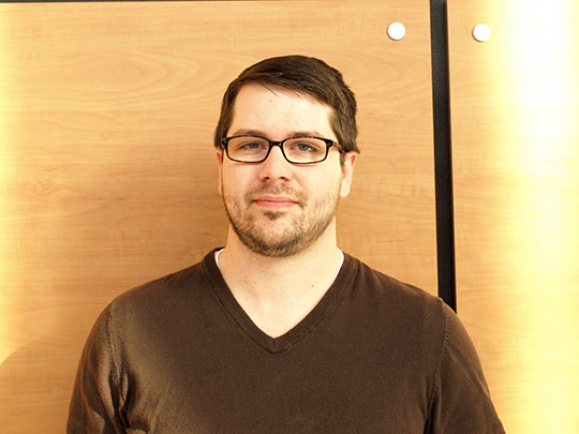News
» Go to news mainPhD's evolutionary genetics project claims top spot in research competition

Dan Gaston, a biochemistry and molecular biology PhD student at Dalhousie University, was recently awarded the Oswald Avery Prize for Genetics Research. Gaston’s winning paper, “A phylogenetic mixture model for the identification of functionally divergent protein residues”, has been out since 2011.
Halifax born, Dr. Avery’s career in research has become widely recognized as being on the forefront of immunochemistry. Avery’s life work led to the important discovery that a cell’s inherited material – which at the time was believed to be comprised of proteins – consisted of deoxyribonucleic acid (DNA).
Avery’s work has long been heralded as the platform of modern genetic research. The Oswald Avery Prize for Genetics Research has been established to honor Dr. Avery’s accomplishments and encourage genetic research at Dalhousie.
New research happening in evolutionary genetics
Gaston’s research focuses on genome, organelle and protein evolution. He began working on the project during the first year of his Masters as a side project; the project quickly transitioned to forming the core of his PhD thesis.
“I was primarily interested in studying how proteins themselves evolve. Just like how species evolve – differentiating and filling new niches over time – so too can proteins. Many events, primarily gene duplication events that leave multiple copies of a gene in an organism’s genome, provide the opportunity for proteins to acquire new functions.”
Gaston describes these changes in function as sometimes being relatively subtle. The small difference between myoglobin (responsible for carrying oxygen to muscle tissue) and hemoglobin (which carries oxygen in the blood) is such a case.
“Although slightly different, these two proteins are related to one another,” said Gaston. “If you look at myoglobin, it has a different binding strength for oxygen. This allows it to grab oxygen from hemoglobin and carry them into working muscles.”
Functional divergence can also be more radical in nature. Enzymes can completely change their genetic process to break down totally new compounds.
Software that takes a closer look
Along with his paper, Gaston developed computer software, called FunDi, to study the evolutionary genetics process of functional divergence after gene duplication events.
Assisted by his supervisor, Andrew Roger, and main collaborator, Edward Susko, the team developed FunDi to better understand evolutionary processes. The model, as Gaston says, is more intuitive in how it studies functional divergence.
“A critical weakness was identified in using existing biological datasets for testing these programs,” said Gaston. “FunDi allows us to zero in on specific parts of a protein that contribute the most to the functional divergence between related proteins.”
While the primary goal of FunDi was simply to better understand the process of functional divergence, Gaston hopes the software will become of value in other areas of genetic research.
“There could be many applications of the FunDi program. It could be used in identifying novel drug-targets or predicting the functional consequence of mutations in genes.”
Gaston and his team have made FunDi freely available to researchers online.
Media Enquiries:
Allison Gerrard, Dalhousie Medical School, (902) 494.1789 / (902) 222.1917, allison.gerrard@dal.ca
Recent News
- New global study Highlights the Biological Roots of Anxiety
- Dalhousie and NCIME launch first‑of‑its‑kind program in Membertou First Nation
- A message from Wanda M. Costen, PhD, Provost and Vice President Academic
- Rhodes scholar Sierra Sparks returns home to study medicine
- President Kim Brooks, Dr. Pat Croskerry appointed to Order of Canada
- Dal’s Highly Cited Researchers reflect on influential global research alliances
- A New Bursary Supporting Black Medical Students at Dalhousie
- Dalhousie’s first physician assistant cohort steps into Nova Scotia’s healthcare system
